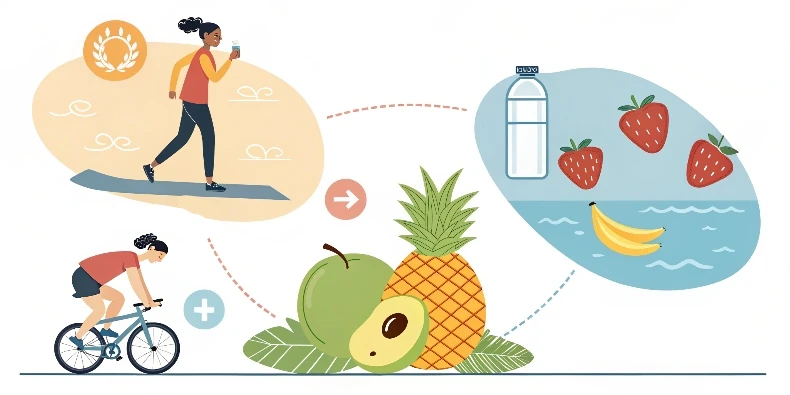In today’s fast-paced world, stress has become an inevitable part of life. Daily responsibilities, work, and family obligations can build up, leading to fatigue and emotional tension. While it’s impossible to eliminate stress entirely, learning how to manage it is essential.
Ignoring stress can negatively impact both mental and physical health. However, stress management is a skill that can be developed. The good news is that you don’t need to invest a lot of time or rely on complex techniques — simple yet effective methods can help restore inner balance quickly.
In this article, we’ll explore how to manage stress effectively, which techniques work best, and which habits can help reduce its impact on daily life.
Stay active: physical activity as a way to combat stress
Physical activity is one of the most effective ways to relieve stress. Regular exercise not only strengthens the body but also helps reduce emotional tension. During physical activity, the body releases endorphins, often called “happiness hormones”, which boost mood and lower anxiety levels.
Additionally, exercise allows you to shift your focus away from daily worries and concentrate on your body, helping to distract from stressors and restore inner balance.
How much time should you devote to physical activity?
You don’t need to spend hours in the gym to feel the benefits. About three hours of moderate physical activity per week is enough. This can include:
- Walking or jogging — improves circulation and increases endurance.
- Cycling or swimming — helps relax muscles and clear the mind.
- Gardening or housework — great alternatives to passive rest.
- Strength training — builds muscle and relieves tension.
The key is to exercise regularly and choose activities you enjoy. Even 10–15 minutes of movement per day can significantly reduce stress levels and improve well-being.
Relax your muscles: relieving physical tension
Stress affects not only the mind but also the body, causing involuntary muscle tension. This can lead to headaches, stiffness in the shoulders and neck, and general fatigue. To release tension and restore ease in the body, it’s essential to regularly practice relaxation techniques.

Simple methods to relieve muscle tension:
- Stretching — reduces stiffness and improves circulation. Just a few minutes of stretching daily can significantly ease physical tension.
- Massage — relaxes muscles, enhances blood flow, and relieves built-up stress. Even a self-massage of the neck and shoulders can bring noticeable relief.
- A warm bath or shower — heat helps muscles relax and soothes the nervous system. Add sea salt or essential oils for maximum relaxation.
- Quality sleep — chronic stress often disrupts sleep, further worsening the condition. Maintain a healthy sleep schedule to allow your body to fully recover.
How to relax during the day?
If you don’t have time for a full break, try quick relaxation techniques. For example, sit down, close your eyes, take a deep breath, and focus on feeling your body relax. Even a couple of minutes of mindful rest can help reduce nervous tension and restore inner balance.
Eat healthy food
A balanced diet plays a key role in managing stress, influencing energy levels, emotional well-being, and overall health. The right nutrition helps stabilize blood sugar levels, strengthen the nervous system, and reduce anxiety.
What to include in your diet:
- Vegetables and fruits — rich in vitamins and antioxidants that protect the body from the effects of stress.
- Whole grains — provide sustained energy through slow-digesting carbohydrates and fiber.
- Lean protein (fish, chicken, eggs, nuts, legumes) — supports serotonin production, which improves mood and reduces anxiety.
- Magnesium-rich foods (spinach, bananas, avocado, almonds) — help relax muscles and regulate nervous system function.
- Omega-3 fatty acids (salmon, flaxseeds, walnuts) — lower cortisol (the stress hormone) and enhance brain function.
What to avoid:
- Skipping meals — leads to blood sugar fluctuations, causing irritability and fatigue.
- Excess caffeine and sugar — provide a temporary energy boost but later increase anxiety and nervous tension.
- Fast food and processed foods — can trigger inflammation in the body and negatively impact mental health.
Try to eat regularly and mindfully, paying attention to how food affects your well-being. A healthy diet is not just about maintaining physical health—it’s also a powerful tool for managing stress.
Avoid unhealthy habits
When stressed, people often seek quick ways to relieve tension. However, some habits that seem harmless may actually worsen the situation, leading to dependency and negatively affecting both physical and mental health.
Why unhealthy habits don’t work
Caffeine, alcohol, smoking, overeating, and other unhealthy stress-relief methods provide temporary relief but create long-term problems:
- Caffeine stimulates the nervous system but, in excess, can increase anxiety and disrupt sleep.
- Alcohol temporarily relaxes, but disrupts neurotransmitter balance, leading to irritability and fatigue once it leaves the system.
- Smoking creates an illusion of relaxation, but actually raises cortisol levels, increasing stress.
- Overeating or consuming sugary and fatty foods may provide momentary comfort, but later leads to sluggishness and guilt.
How the body adapts to unhealthy habits
Our body naturally seeks to preserve energy and takes the easiest path to stress relief. If you become accustomed to relaxing with alcohol or smoking, your body begins to see them as primary coping mechanisms. As a result, motivation for healthier stress-relief methods (exercise, meditation, or walking) decreases.
How to avoid the trap of unhealthy habits
- Replace bad habits with healthy alternatives — find enjoyable activities with no negative consequences (e.g., sports, reading, or breathing exercises).
- Think about long-term effects — unhealthy habits provide only short-term relief but ultimately worsen stress.
- Develop mindfulness — monitor your reactions and ask yourself: “Will this truly help me in the long run?”
By choosing healthier stress-relief methods, you not only avoid negative consequences but also build long-term resilience to stress, improving your overall quality of life.
Get enough sleep

Chronic stress is closely linked to sleep quality. When you have too many tasks and unresolved issues, your brain stays active even at night, preventing deep rest. However, sleep is a crucial recovery mechanism that helps reset the nervous system and prepare the body for a new day.
Effects of sleep deprivation:
- Increased anxiety and irritability.
- Reduced concentration and productivity.
- Weakened immune system and persistent fatigue.
- Worsened stress levels, creating a vicious cycle of insomnia.
How to improve sleep and reduce stress
To prevent sleep problems, it’s essential to follow evening rituals and create the right conditions for rest:
- Limit screen time before bed. Avoid using your phone or computer at least an hour before bedtime to reduce the strain on your nervous system. Blue light from screens suppresses the production of melatonin, the sleep hormone.
- Create a relaxing atmosphere. Use aromatherapy, soft music, or dim lighting to signal to your brain that it’s time to wind down.
- Ventilate the room. Fresh air helps naturally lower body temperature, making it easier to fall asleep.
- Maintain a consistent sleep schedule. Going to bed and waking up at the same time every day helps regulate your internal clock, leading to deeper, higher-quality sleep.
- Take a short walk before bed. A light walk in the fresh air helps relieve tension and naturally prepares your body for rest.
Quality sleep is one of the most effective ways to manage stress. Chronic sleep deprivation weakens the body and makes it more vulnerable to external stressors. Prioritizing your sleep will help reduce stress levels and restore energy more efficiently.
Meditate: deep breathing for stress management
Meditation and deep breathing are powerful stress-relief techniques that help reduce anxiety and restore a sense of calm. When we feel tense, our breathing becomes shallow and rapid, intensifying the body’s stress response. By controlling your breath, you can slow your heart rate, relax your muscles, and restore emotional balance.
Try this simple deep breathing technique:
1️⃣ Find a comfortable position — sitting or lying down.
2️⃣ Close your eyes and take a slow, deep inhale through your nose, counting to four.
3️⃣ Hold your breath for a couple of seconds.
4️⃣ Exhale slowly through your mouth, counting to six.
5️⃣ Repeat this cycle 5–10 times, focusing on the sensations in your body.
This technique can be used anytime, anywhere — at work, at home, or even during your commute. Regular deep breathing practice helps lower cortisol levels (the stress hormone), improves concentration, and promotes emotional stability, even in challenging situations.
Make time for hobbies: embrace creativity
Engaging in activities that bring you joy helps relieve stress and restore inner balance. It’s important to set aside time for hobbies, even if it’s just 15–20 minutes a day. Whether it’s reading, painting, knitting, playing a musical instrument, or simply taking a walk, dedicating time to things you love can have a profound impact on your well-being.
When we engage in creative activities, our brain shifts focus away from worries and stress, immersing itself in the creative process. This naturally reduces anxiety and promotes relaxation. The key is to do what you enjoy, without pressure or expectations — simply savor the moment. This makes stress relief an effortless part of daily life.
Try one of these relaxing hobbies:
- Reading — allows you to escape into a new world and take your mind off worries.
- Drawing or knitting — fosters creativity and has a calming effect.
- Listening to or playing music — helps reduce anxiety and improve mood.
- Solving puzzles or crosswords — sharpens focus and enhances concentration.
- Board games or card games — a fun way to relax and spend time with loved ones.
- Walking outdoors — refreshes the mind and boosts overall well-being.
Hobbies aren’t just for entertainment — they are an essential part of emotional well-being. Make time for activities that bring you joy, and you’ll notice how stress levels decrease and your mood improves.
Listen to music
Music is one of the most accessible and effective stress-relief tools. It helps distract from anxious thoughts, relax muscles, and reduce stress hormones. Research shows that slow melodies can lower heart rate and breathing, creating a sense of calm and relaxation.
To maximize the benefits, listen mindfully — avoid distractions and fully immerse yourself in the rhythm and melody. Choose music that brings you comfort and relaxation — this could be classical pieces, nature sounds, jazz, or even your favorite nostalgic songs that evoke positive emotions.
When you feel overwhelmed, put on your headphones, close your eyes, and let the music transport you to a state of peace. This simple yet powerful technique can help restore emotional balance and improve your overall mood.
Laugh more
Laughter is one of the most unexpected yet effective ways to combat stress. It helps relieve tension, boost mood, and triggers positive physiological changes in the body. When we laugh, stress hormone levels decrease, while the production of endorphins — the so-called “happiness hormones” — increases.

Even if you don’t feel particularly cheerful, try to smile — your brain will interpret it as a signal to relax. Watch a comedy, read funny stories, recall amusing moments from your life, or spend time with people who lift your spirits.
Another interesting technique is laughter yoga, a practice where laughter is used as an exercise until it becomes natural. It doesn’t matter what you’re laughing at — what matters is that it helps your body and mind cope with stress.
Connect with others
When stress and anxiety levels rise, we often instinctively withdraw from social interactions. However, in these moments, the support of loved ones can be the best remedy for restoring emotional balance. Socializing helps distract you from worries, shift your perspective, and reduce emotional tension.
Try reaching out to a friend or family member, discussing what’s on your mind, or simply enjoying some quality time together. Even a brief conversation can significantly improve your mood. If possible, combine social interaction with physical activity — go for a walk or exercise with loved ones.
Another powerful way to boost your well-being is volunteering. Helping others not only makes a difference but also gives your life a greater sense of purpose, which has a positive impact on mental health.
Talk about your problems — don’t bottle up stress
If something is bothering you, discussing the issue can help reduce stress levels. Talking to a loved one, friend, mentor, or professional allows you to unload mental tension, gain clarity, and find possible solutions.
Don’t be afraid to share your concerns — voicing your thoughts prevents negativity from building up and helps protect against emotional burnout. Even if you’re not ready to talk to someone else, simply having a conversation with yourself can be beneficial. The key is to make it supportive rather than self-critical.
Pay attention to your inner dialogue: if you find yourself thinking negatively, try reframing it into something constructive and encouraging. Instead of saying, “I can’t handle this”, tell yourself, “I will do my best and take it one step at a time”. This shift in mindset reduces anxiety and strengthens self-confidence.
Slow down: create balance in your life
Modern life demands constant speed, but the ability to slow down is one of the most effective stress management techniques. Rushing all the time drains your energy, so it’s crucial to make time for mindful pauses.
Try these simple techniques:
- Set your clock 5–10 minutes ahead to avoid rushing and unnecessary stress when leaving home.
- Choose the slow lane while driving — this helps reduce tension and avoid frustration in traffic.
- Break large tasks into smaller steps. Instead of tackling 100 emails at once, respond to a few and then take a short break.
- Don’t be afraid to take a step back to maintain inner peace — it will help you stay efficient and stress-free.
Take a break: give yourself time to recharge
A fast-paced, always-busy lifestyle can cause stress to accumulate, making it essential to schedule time for rest. Even a short break allows your brain to recover and reduce anxiety levels.
If you’re used to being productive all the time, it may feel challenging to take a break without guilt. But regular pauses not only improve your well-being but also boost overall effectiveness.
Try one of these relaxation techniques:
- Meditation or breathing exercises to promote relaxation.
- Cooking a new dish to shift your focus and engage your senses.
- A walk in nature to refresh your mind and restore energy.
- Yoga or gentle stretching to release tension.
Allow yourself to explore new ways to rest or return to activities that have always brought you joy. Remember, a quality break is not wasted time — it’s an investment in your health and productivity.
Keep a journal
One of the simplest and most effective ways to relieve stress is keeping a journal. Writing down your thoughts and emotions allows you to process your experiences and free your mind from anxious overthinking.
Don’t worry about phrasing things perfectly — write as you feel. Your journal is for you, not for others, so there are no rules. Just let your thoughts flow onto paper or a screen.
After writing, you can:
- Keep your entry to review later and analyze your emotions.
- Discard or delete it if writing was simply a way to clear your mind.
This method helps structure your thoughts, process emotions, and reduce internal tension, making it a powerful stress-management tool.
Eliminate triggers: minimize stress factors
To effectively manage stress, it’s important to identify what triggers it. Determine your main stressors — whether it’s work, studies, fatigue, social media, or certain people.

How to minimize trigger influence:
- Analyze your day and pinpoint moments when your stress levels are highest.
- Adjust your routine — for example, if your commute stresses you out, explore alternative routes or travel times.
- Set clear boundaries — limit interactions with toxic people and learn to say “no” to excessive workloads.
- Optimize your environment — reduce noise, limit exposure to stressful news, and create a more organized and peaceful personal space.
If eliminating triggers isn’t possible, changing your attitude toward them can be just as powerful in reducing stress.
Be kinder to yourself
Stop demanding unrealistic perfection from yourself. No one can control everything or do everything flawlessly — and that’s okay. Allow yourself to be human — to make mistakes, miss deadlines, and not blame yourself for it.
- Don’t overload yourself — make space for rest and recovery.
- Let go of things beyond your control — learn to accept what can’t be changed.
- Keep your sense of humor — laughter reduces stress and helps you see challenges from a different perspective.
Be kinder to yourself, and life will feel lighter — sometimes, the best way to cope with stress is simply to allow yourself to be you.


